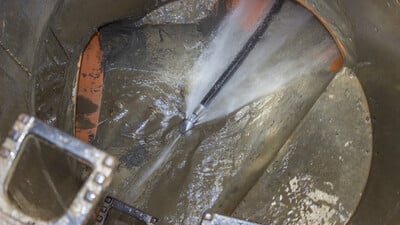Methods of Drain Cleaning and Their Environmental Impact
Blocked drains can cause inconvenience, damage and even pose health risks if left untreated. Various methods are available for clearing blockages, each with its own environmental implications. Understanding these can help in making an informed decision about the best approach.
Drain Rodding
Drain rodding is one of the oldest and simplest ways to clear a blockage. It involves using a series of flexible rods to manually push through obstructions.
Environmental Impact:
- No chemicals are required, making it an eco-friendly option.
- Minimal water usage compared to jetting.
- Can be labour-intensive and ineffective for more stubborn blockages.
High-Pressure Water Jetting
Water jetting uses powerful streams of water to break up and flush away blockages.
Environmental Impact:
- No harmful chemicals are used, reducing pollution risk.
- Requires a significant amount of water, which may contribute to waste if not managed properly.
- The force of the jet can damage older pipework, potentially leading to leaks and water contamination.
Chemical Drain Cleaners
Chemical treatments involve using caustic or acidic substances to dissolve blockages.
Environmental Impact:
- Chemicals can be harmful to aquatic life if they enter watercourses.
- Some substances release toxic fumes that are hazardous to human health.
- Can corrode pipes over time, leading to leaks and further environmental damage.
Drain Snaking (Auger)
A drain snake or auger is a mechanical tool that is inserted into the pipe to break up or retrieve blockages.
Environmental Impact:
- No chemicals are used, making it a greener option.
- Requires no water, making it more sustainable than jetting.
- Can be labour-intensive but effective for certain types of obstructions.
Biological Drain Cleaners
Biological treatments use enzymes and bacteria to break down organic matter in pipes.
Environmental Impact:
- Completely natural and non-toxic, making it one of the most environmentally friendly options.
- Works more slowly than chemical treatments and may not be effective on severe blockages.
- Helps maintain a healthy balance in drainage systems when used regularly.
How to Reduce Environmental Impact by Preventing Blockages
Preventing drain blockages is the best way to reduce the environmental impact of clearing them. Here are some practical steps:
Dispose of Fats, Oils, and Grease (FOG) Properly
Avoid pouring cooking oils and grease down the sink; instead, collect and dispose of them with household waste or through a recycling scheme.
Use Drain Guards
Installing drain guards in sinks and shower drains prevents debris such as food particles, hair, and soap scum from entering the system.
Maintain Regularly
Periodically flushing drains with hot water and baking soda or using biological cleaners can prevent accumulation without harming the environment.
Educate Households and Businesses
Raising awareness of what should and shouldn’t go down drains can significantly reduce the likelihood blockages.
Drainfast – The Drainage Experts
This information is brought to you by Drainfast, one of the UK’s largest independent drainage products suppliers. While we don’t clean drains, we do stock a full range of drainage pipes, fittings and accessories for immediate despatch throughout the UK, so if you need a friendly, fast supplier of drainage products, call Drainfast today!

Written by
Vicki James
Sales & Marketing Coordinator
Vicki is a vital part of the marketing team; from reporting to copywriting, she ensures we complete projects on time.

